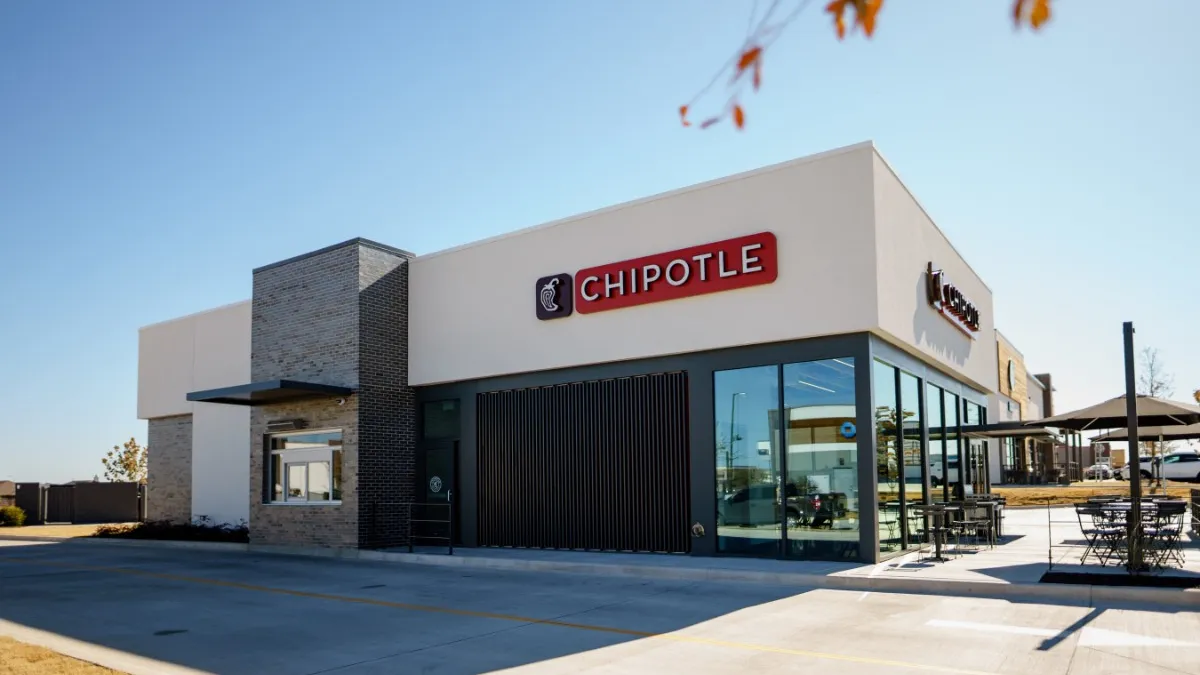Dive Brief:
- Chipotle ranks as the top restaurant brand for health and safety compliance during COVID-19, according to data from global market research firm Ipsos' Consumer Health & Safety Index email to Restaurant Dive. Ipsos mystery shoppers conducted in-store visits at over 5,700 retailers across the U.S. and assessed which brands were successfully implementing health and safety measures and which were not.
- Employees at 90% of the Chipotle locations visited were consistently wearing masks, while 83% of locations included employees wearing gloves. Further, 49% of Chipotle’s locations have hand sanitizer available at the entrance and 82% have hand sanitizer available in restrooms. The industry average for the latter metric is just 24%.
- McDonald's and Starbucks both also were among the top for QSRs. At 95% of McDonald's locations visited, there were barriers in place at checkout and 87% had motion-activated or touchless fixtures in bathrooms. The report said 93% of Starbucks employees at locations visited wore masks while 83% of stores visited had contactless payment options.
Dive Insight:
All three of these top brands have communicated their safety priorities on their websites, with occasional updates as CDC guidelines have changed throughout the pandemic. Chipotle announced an update in April, for example, that it was expanding its free delivery promotion for customers who prefer that contactless option.
Contactless is just one added measure, however. The chain also added tamper-evident packaging seals on every order bag, six-foot line marks in-store to indicate social distancing, daily wellness checks for its employees, regular sanitization throughout the restaurant and an air purification system.
Starbucks updated its safety protocols in May, including mobile ordering for contactless pickup, delivery and curbside. McDonald’s released its reopening protocols in May, covering everything from touchless sinks to pulls that allow customers to open bathroom doors with their feet.
These three brands are not alone in communicating comprehensive reopening guidelines. Nearly every major restaurant brand, including Yum Brands, Restaurant Brands International, Chick-fil-A and Subway, released some type of plan outlining very specific measures put into place to curb the virus as dining rooms begin to reopen. Having transparent safety standards available online helps customers understand what to expect when they visit while also showing the company is doing what it can to keep customers safe.
But Chipotle, McDonald’s and Starbucks seem to be executing more. Chipotle and Starbucks may have a good reason for this. As company-owned models, they arguably have more control over their employees’ policies than a franchised model. A mask mandate from corporate is likely more executable than franchisees in regions with varying state-mandated guidelines.
McDonald’s is an outlier here, as 95% of its system is franchised. But the company’s 59-page guide was comprehensive, especially considering the CDC’s guidance was about 57 pages. McDonald’s has also left it up to individual franchisees to decide when to reopen.
That’s not to say these companies haven’t received criticism from their employees. Five McDonald’s employees and their families filed a class-action lawsuit against McDonald’s, alleging that the company didn’t provide adequate protection against COVID-19. Employees in Oakland, California filed a lawsuit against a franchisee owner alleging that employees were forced to wear masks made from dog diapers. Starbucks employees have also pushed back against reopening, with one manager telling NBC News that they “have no idea which customers have been following procedures or who has been in hospitals.” New York City Chipotle workers filed an OSHA complaint in May claiming that employees aren't told when coworkers are quarantined with coronavirus symptoms.
While restaurants can have the best safety procedures in place and execute on those procedures, that doesn’t mean customers and employees will automatically feel safe about their environment. Many chains' plans have been in place for more than a month, but only 19% of consumers are “very comfortable” and would “go to a restaurant immediately” for dine-in service, once they open in their area/state, according to a Toast survey. If there is a silver lining here, it’s that the restaurants that have put the best safety procedures into place will likely be best positioned in a post-pandemic world. A Dataessential report reveals that sanitation will be the top diner concern when COVID-19 dissipates.
Correction: A previous version misidentified specific rankings for Starbucks and McDonald's. They were among the top QSR brands for safety compliance.











